Revisiting Everson: Thrown Off Course
Eric Lipman March/April 2007
Getting your Trinity Audio player ready...
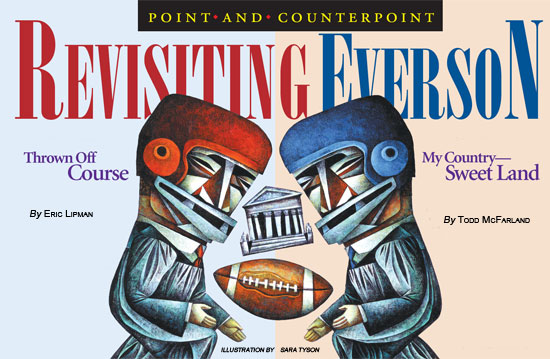
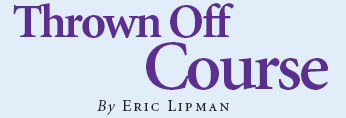
Yet today, as Americans struggle over the text of the Pledge of Allegiance or whether prayers may be recited in public settings, this premise from the Founding Fathers seems very remote. Many Americans regard it as simply inappropriate for government and its elected officials to make public references to the Almighty.
How did we get here? To my mind, the real trouble started six decades ago.
In 1947 the United States Supreme Court decided a case entitled Everson v. Board of Education of Ewing Township. At issue in the Everson case was whether a law allowing the parents of parochial school students to receive reimbursement for sending their children to school on local buses violated the Establishment Clause. Arch Everson, a Ewing Township resident and taxpayer, claimed that the reimbursement plan violated the First Amendment's prohibition on laws "respecting an establishment of religion."
The Everson case is a fine example of how one can decisively win the battle, only to lose the larger war. A majority of the United States Supreme Court ruled (in my view, correctly) that the township's choice to subsidize transportation costs did not amount to an establishment of a state religion. Yet, in writing for the majority of the Court, Justice Hugo Black handed down language that would be a source of so many later difficulties. Black declared:
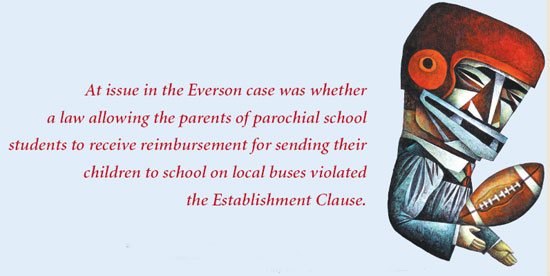
"The First Amendment has erected a wall between church and state. That wall must be kept high and impregnable. We could not approve the slightest breach. New Jersey has not breached it here."
Because maintaining a "high and impregnable" wall of separation between government and the Creator has such profound implications, a few points deserve special emphasis.
First, as an example of legal reasoning, the opinion in Everson is simply dreadful. Justice Black takes the Establishment Clause—which states "Congress shall make no law respecting an establishment of religion"—and bends what were limitations on congressional powers into a new set of limitations upon the states. Poof! A completely new rule was forged with the stroke of a pen. Up until that time, it was widely regarded that the states had very wide authority in religious matters.
Second, and perhaps more important, Justice Black bows out of the language of the Establishment Clause so as to cover a completely new divide in America: Those who believe in a Creator and those who do not. While the First Amendment, as written by the Framers, proscribed Congress from making a law respecting the establishment of a state religion, the now Black-ened First Amendment prohibited American government from identifying with those who believe in God. Up until the Everson case this had never been the rule.
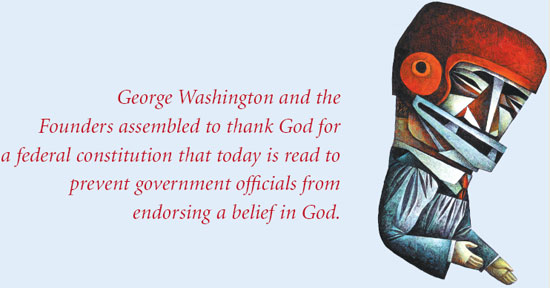
To the contrary, while the Founders came from a wide of array of religious denominations, they shared a common vision of the United States as a covenant nation that had a special relationship to the Creator. This description includes Thomas Jefferson—who is so often cited by those who insist upon strict religious sterility in the public square. For example, when Jefferson was asked to propose a design for the Great Seal of the United States, he, along with Benjamin Franklin, proposed a seal that recreated the Exodus scene of Moses leading the Israelites out of Egyptian bondage. They recast the Old Testament scene as an allegory to the then-current pursuit by armies of a new Pharaoh—George the Third of Britain. The proposed seal captured the Framers' wish that God would collapse the seas upon the advancing British garrisons, and thereby save America; a more recent "chosen people." Lest there be any doubt that Jefferson and Franklin both believed that the American rebellion against the British Crown furthered a holy purpose, they also proposed affixing to this American Seal the motto "Rebellion to Tyrants is Obedience to God."
Clearly, if the story of Exodus can summarize and present the worldview of our nation's founders, it simply makes no sense that their official successors today may not—in keeping with the Constitution that they wrote—propagate this very same idea.
Further still, within eight days of having sent the text of the Establishment Clause to the states for ratification, both houses of Congress dispatched to President George Washington a request that he proclaim a national day "of public thanksgiving and prayer to be observed by acknowledging with grateful hearts the many signal favors of Almighty God." Washington acceded to the request and issued a proclamation that repeats, over and over again, the then widespread belief that God gave His providential hand to America, its successes and the new nation's Constitution.
Now there is an irony: as soon as the Bill of Rights was complete, George Washington and the Founders assembled to thank God for a federal constitution that today is read to prevent government officials from endorsing a belief in God.
I suspect that one reason Justice Black got the Establishment Clause so grievously wrong in the Everson case was that he was being tugged to the left by his fellow New Dealer, Justice Wiley Rutledge. In what would be Rutledge's most famous opinion during his short, six-year tenure on the U.S. Supreme Court, he pounded on Black and the others in the Everson majority. In his dissenting opinion, Rutledge struck the most absolutist and unyielding stance; declaring that any aid for religious institutions—no matter how small—would throw the country uncontrollably toward religious repression. Rutledge describes how America will tumble from reimbursing bus fare to turbulent sectarian chaos, in this way:
"Public money devoted to payment of religious costs, educational or other, brings the quest for more. It brings too the struggle of sect against sect for the larger share or for any. . . This is not therefore just a little case over bus fares. In paraphrase of Madison, distant as it may be in its present form from a complete establishment of religion, it differs from it only in degree; and is the first step in that direction. Today as in his time 'the same authority which can force a citizen to contribute three pence only. . . for the support of any one religious establishment, may force him' to pay more; or 'to conform to any other establishment in all cases whatsoever'."
Faced with Rutledge's claim that repressive theocracy was just around the corner, Justice Black's description of the "wall between church and state" became likewise fierce.
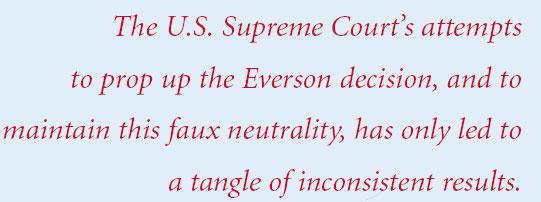
As 50 years of litigation that has followed the Everson case has proven, however, the task of reconciling our early history with the requirement of neutrality between believers and nonbelievers is just not possible. Indeed, the U.S. Supreme Court's attempts to prop up the Everson decision, and to maintain this faux neutrality, has only led to a tangle of inconsistent results. The late Chief Justice William Rehnquist once summarized the contradictory sets of instructions that the High Court has given to state and local governments in this way:
"A State may lend to parochial school children geography textbooks that contain maps of the United States, but the State may not lend maps of the United States for use in geography class. A state may lend textbooks on American colonial history, but it may not lend a film on George Washington, or a film projector to show it in history class. A state may lend classroom workbooks, but may not lend workbooks in which the parochial school children write, thus rendering them nonreusable."
America deserves better than this. Government that the people instituted, and that operates in their name, should produce more principled results than these.
Part of the solution is to return to the earlier, pre-Everson traditions. Strict neutrality between believers and nonbelievers was a foolish experiment for America to undertake in the first instance, and we should reverse this course with all deliberate speed.
The Founders knew what many in Washington, D.C., today have apparently forgotten: Public expressions of belief in a higher power is not only an essential element of the American character; it is a necessary component of any later national success.
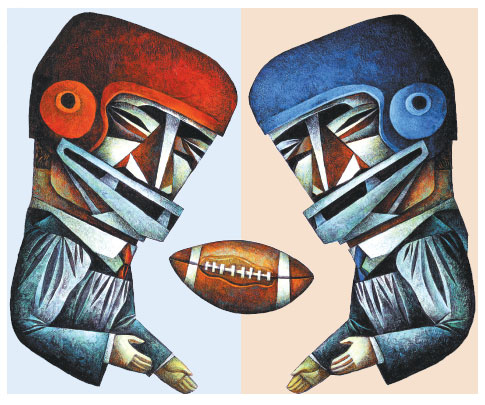
Eric Lipman is an attorney and former member of the Minnesota House of Representatives.
1 See Everson v. Board of Education of Ewing Township, 330 U.S. pp. 1, 8 (1947).
2 See Everson, 330 U.S. at p. 18 (emphasis added).
3 See Ibid., pp. 15-16; compare Van Orden v. Perry, U.S., 125 S. Ct. 2854, 2865 (Thomas, U., concurring).
4 See e.g., Ex parte Garland, 71 U.S. pp. 333, 397 (1866) ("No restraint is placed by that instrument on the action of the States; but on the contrary, in the language of [Justice] Story, 'the whole power over the subject of religion is left exclusively to the State governments, to be acted upon according to their own sense of justice and the State constitutions).'"
5 See J. Hutson, Religion and the Foundation of the American Republic, at pp. 50, 51 (1998).
6 See Ibid; compare also, Inaugural Address of President Jefferson, Inaugural Addresses of the Presidents of the United States, at pp. 18, 22, 23 ("I shall need, too, the favor of that Being in whose hands we are, who led our fathers, as Israel of old, from their native land and planted them in a country flowing with all the necessaries and comforts of life").
7 See e.g., American Civil Liberties Union v. McCreary County, Ky., 354 F. 3d pp. 438, 469 (6th Cir. 2003) (Ryan, J., dissenting); see also, Thomas Jefferson, Notes on the State of Virginia (1782) ("And can the liberties of a nation be thought secure when we have removed their only firm basis, a conviction in the minds of the people that these liberties are the gift of God?").
8 H. R. Journal, 1st Cong., 1st Sess. 123 (1826 ed.) (emphasis added); see also, Sen. Jour., 1st Sess., p. 88, (1820).
9 See J. D., Richardson, Messages and Papers of the Presidents 1789-1897, at 64 (1899); see also, Inaugural Addresses of the Presidents of the United States, S. Doc. No. 10, 101st Cong., 1st Sess. 2 (1989) ("No people can be 1st bound to acknowledge and adore the invisible Hand which conducts the affairs of men more than those of the States," because "every step by which they have advanced to the character of an independent nation seems to have been distinguished by some token of providential agency").
10 Everson, 330 U.S. at 53-57 (emphasis added).
11 Wallace v. Jaffree, 472 U.S. 38, pp. 110-111 (1985) (Rehnquist, J., dissenting).